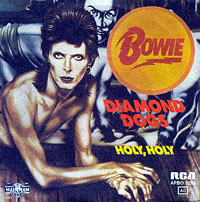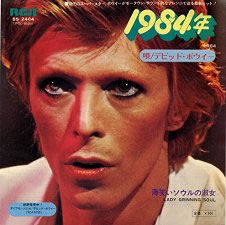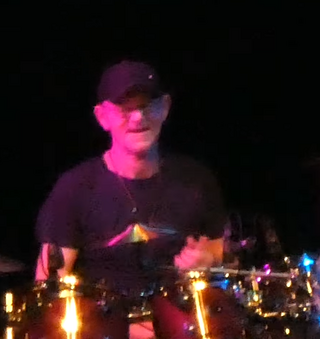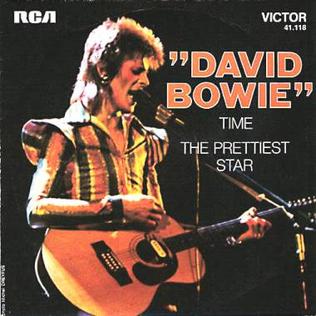Related Research Articles

Diamond Dogs is the eighth studio album by the English musician David Bowie, released on 24 May 1974 through RCA Records. Bowie produced the album and recorded it in early 1974 in London and the Netherlands, following the disbanding of his backing band the Spiders from Mars and the departure of producer Ken Scott. Bowie played lead guitar on the record in the absence of Mick Ronson. Diamond Dogs featured the return of Tony Visconti, who had not worked with Bowie for four years; the two would collaborate for the rest of the decade. Musically, it was Bowie's final album in the glam rock genre, though some songs were influenced by funk and soul music, which Bowie embraced on his next album, Young Americans (1975).

"Rebel Rebel" is a song by the English singer-songwriter David Bowie. It was released in the UK in February 1974 by RCA Records as the lead single from the album Diamond Dogs. Written and produced by Bowie, the song is based around a distinctive guitar riff reminiscent of the Rolling Stones. Cited as his most-covered track, "Rebel Rebel" has been described as Bowie's farewell to the glam rock movement that he had helped initiate, as well as being a proto-punk track. Two versions of the song were recorded: the well-known UK single release and the shorter US single release, which featured added background vocals, extra percussion and a new arrangement.

"Diamond Dogs" is a 1974 single by English singer-songwriter David Bowie, the title track of the album of the same name.

"1984" is a song by the English musician David Bowie, from his 1974 album Diamond Dogs, released as a single in the United States and Japan. Written in 1973, it was inspired by George Orwell's Nineteen Eighty-Four and, like much of its parent album, originally intended for a stage musical based on the novel, which was never produced because permission was refused by Orwell's widow Sonia.
"Aladdin Sane (1913–1938–197?)" is a song by the English singer-songwriter David Bowie, the title track from his 1973 album Aladdin Sane. Described by biographer David Buckley as the album's "pivotal" song, it saw Bowie moving into more experimental musical styles following the success of his breakthrough glam rock release The Rise and Fall of Ziggy Stardust and the Spiders from Mars in 1972.

"Holy Holy" is a song by the English singer-songwriter David Bowie, originally released as a single in January 1971. It was recorded in November 1970, after the completion of The Man Who Sold the World, in the perceived absence of a clear single from that album. Like Bowie's two previous singles, it sold poorly and failed to chart.

"John, I'm Only Dancing" is a song by the English musician David Bowie, originally released as a non-album single on 1 September 1972. A glam rock and R&B number, the lyrics describe a situation in which the narrator informs his lover not to worry about the girl he is with because he is "only dancing" with her. Although ambiguous, many interpreted it as concerning a gay relationship. Recorded in London in June 1972, it was boosted by a low-budget promotional video directed by Mick Rock. It reached number 12 in the UK; RCA refused to release it in America due to its suggestive lyrical content.

"Rock 'n' Roll Suicide" is a song by the English singer-songwriter David Bowie, originally released as the closing track on the album The Rise and Fall of Ziggy Stardust and the Spiders from Mars on 16 June 1972. Co-produced by Ken Scott, Bowie recorded it with his backing band the Spiders from Mars – comprising Mick Ronson, Trevor Bolder and Mick Woodmansey. It detailed Ziggy's final collapse like an old, washed-up rock star and, as such, was also the closing number of the Ziggy Stardust live show. In April 1974 RCA issued it as a single.

Michael "Woody" Woodmansey is an English rock drummer best known for his work in the early 1970s as a member of David Bowie's core backing ensemble that became known as the Spiders from Mars in conjunction with the release of Bowie's 1972 LP The Rise and Fall of Ziggy Stardust and the Spiders from Mars. With the death of Bowie in January 2016, Woodmansey became the last surviving member of the Spiders.

"Queen Bitch" is a song by the English singer-songwriter David Bowie. It was originally released on his 1971 album Hunky Dory before appearing as the B-side of the single "Rebel Rebel" in the United Kingdom in early 1974. Co-produced by Bowie and Ken Scott, the lineup consisted of the musicians who would later become known as the Spiders from Mars: Mick Ronson, Trevor Bolder and Mick Woodmansey.
"Five Years" is a song by the English musician David Bowie, released on his 1972 album The Rise and Fall of Ziggy Stardust and the Spiders from Mars. Co-produced by Bowie and Ken Scott, it was recorded in November 1971 at Trident Studios in London with his backing band the Spiders from Mars − comprising Mick Ronson, Trevor Bolder and Mick Woodmansey. As the opening track on the album, the song introduces the overarching theme of the album: an impending apocalyptic disaster will destroy Earth in five years and the being who will save it is a bisexual alien rock star named Ziggy Stardust. While the first two verses are told from a child narrator's perspective, the third is from Bowie's, who addresses the listener directly. As the track progresses, it builds intensity, before climaxing with strings and Bowie screaming the title.

"Velvet Goldmine" is a song by the English singer-songwriter David Bowie. A glam rock number with lyrical references to oral sex, it was originally recorded on 11 November 1971 at Trident Studios in London during the sessions for his 1972 album The Rise and Fall of Ziggy Stardust and the Spiders from Mars. It was ultimately left off the album and subsequently released as a B-side of the UK re-release of "Space Oddity" in 1975. Praised by biographers as an undervalued classic, it later appeared on compilation albums, including on Re:Call 1, part of the Five Years (1969–1973) boxed set, in 2015. Its namesake was used for Todd Haynes's 1998 film of the same name.
"Watch That Man" is a song by the English musician David Bowie, the opening track on the album Aladdin Sane from 1973. Its style is often compared to the Rolling Stones' Exile on Main Street. The mix, in which Bowie's lead vocal is buried within the instrumental sections, has generated discussion among critics and fans.
"Panic in Detroit" is a song written by the English singer-songwriter David Bowie for the album Aladdin Sane in 1973. Bowie based it on his friend Iggy Pop's descriptions of revolutionaries he had known in Michigan and Pop's experiences during the 1967 Detroit riots. Rolling Stone magazine called the track "a paranoid descendant of the Motor City's earlier masterpiece, Martha and the Vandellas' "Nowhere to Run"".
"Cracked Actor" is a song by the English musician David Bowie, released on his sixth studio album Aladdin Sane (1973). The track was also issued as a single in Eastern Europe by RCA Records in June that year. The song was written during Bowie's stay in Los Angeles during the American leg of the Ziggy Stardust Tour in October 1972. Co-produced by Bowie and Ken Scott, it was recorded in January 1973 at Trident Studios in London with his backing band the Spiders from Mars – comprising Mick Ronson, Trevor Bolder and Woody Woodmansey. A hard rock song primarily led by guitar, the song describes an aging Hollywood star's encounter with a prostitute, featuring many allusions to sex and drugs.

"Time" is a song by the English singer-songwriter David Bowie. Written in New Orleans in November 1972 during the American leg of the Ziggy Stardust Tour, it was recorded in London in January 1973 and released as the opening track on side two of the album Aladdin Sane that April. An edited version of the song supplanted the release of the single "Drive-In Saturday" in the United States, Canada and Japan. It was also released in France and South Africa, while early Spanish copies of David Live included a free copy of the single.
"Lady Grinning Soul" is a song by the English musician David Bowie, released on the album Aladdin Sane in 1973. It was a last-minute addition, replacing the "sax version" of "John, I'm Only Dancing" as the closing track. The composer's first meeting with American soul singer Claudia Lennear in 1972 is often cited as the inspiration for the song. In 2016, after Bowie's death, an interview with Lennear revealed that Bowie called her in 2014, and told her the song had been written about her.
"Sweet Thing" or "Sweet Thing/Candidate/Sweet Thing (Reprise)" is a suite of songs written by David Bowie for the album Diamond Dogs. Recorded in January 1974, the piece comprises the songs "Sweet Thing" and "Candidate" and a one-verse reprise of "Sweet Thing."

"Rock 'n' Roll with Me" is a power ballad written by David Bowie and Geoff MacCormack and recorded in January 1974 that first appeared on Bowie's Diamond Dogs album, supposedly to address the artist's complex relation with his fans. A version recorded during the Diamond Dogs tour in July 1974 was released on the album David Live.

"Can You Hear Me?" is a ballad by the English musician David Bowie from his 1975 album Young Americans. Bowie called it a "real love song", written with someone in mind, but he did not identify them. The song was released as a single in November 1975 on the B side of "Golden Years".
References
- ↑ "Diamond Dogs album is forty today". Archived from the original on 23 September 2015. Retrieved 6 June 2015.
- ↑ Sweeting, Adam (24 June 2004). "David Bowie, Diamond Dogs – 30th Anniversary Edition". The Guardian . Archived from the original on 22 June 2020. Retrieved 10 July 2020.
- ↑ David Buckley (1999). Strange Fascination - David Bowie: The Definitive Story: p.214
- 1 2 Nicholas Pegg (2000). The Complete David Bowie: pp.38-39
- ↑ Roy Carr & Charles Shaar Murray (1981). Bowie: An Illustrated Record: p.64
- ↑ Pegg 2016, p. 643.
- ↑ O'Leary 2015, chap. 8.
Sources
- O'Leary, Chris (2015). Rebel Rebel: All the Songs of David Bowie from '64 to '76. Winchester: Zero Books. ISBN 978-1-78099-244-0.
- Pegg, Nicholas (2016). The Complete David Bowie New Edition: Expanded and Updated. London: Titan Books. ISBN 9781785655333.